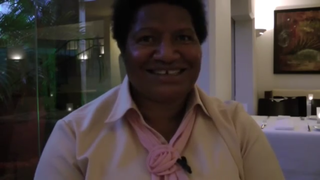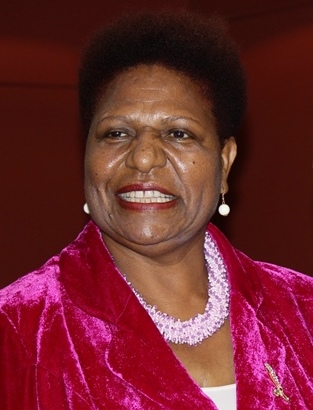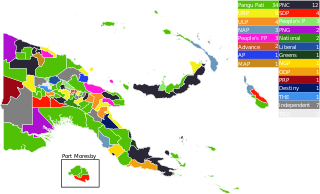Related Research Articles

The politics of Papua New Guinea takes place in a framework of a parliamentary representative democratic multi-party system,whereby the prime minister is the head of government. Papua New Guinea is an independent Commonwealth realm,with the monarch serving as head of state and a governor-general,nominated by the National Parliament,serving as their representative. Executive power is exercised by the government. Legislative power is vested in both the government and parliament.
The Papua New Guinea Country Party is a political party in Papua New Guinea. It was founded in 1974.

General elections were held in Papua New Guinea between 18 June and 9 July 1977,the first since independence from Australia in 1975. The Pangu Party led by Prime Minister Michael Somare emerged as the largest in the National Parliament. Somare subsequently formed a coalition government with the People's Progress Party (PPP) and several independent MPs. Voter turnout was 60.3%.

General elections were held in Papua New Guinea between 5 and 26 June 1982. The result was a victory for the Pangu Party,which won 51 of the 109 seats. Voter turnout was 52%.

Nahau Rooney,CSM was a Papua New Guinean politician. From 1977 to 1987 she was a member of the newly founded post-independence National Parliament of Papua New Guinea.

Joses Tuhanuku is a Solomon Islands politician and former trade union leader. He served three terms in Parliament before losing his seat in the 2006 general election.

General elections were held in Papua New Guinea between 24 June and 8 July 2017. The writs for the election were issued on 20 April,and candidate nominations closed on 27 April.
Akoka Doi,CMG is a Papua New Guinean politician. He was a member of the National Parliament of Papua New Guinea from 1977 to 1992,representing the electorate of Ijivitari Open.
Grand Chief Brigadier Edward Ramu (Ted) Diro,GCL,CBE is a Papua New Guinean politician and soldier.
There have been 10 women in the National Parliament of Papua New Guinea since the independence of Papua New Guinea in 1975.
Enny Moaitz is a Papua New Guinean politician. She was Premier of Morobe Province from 1987 to 1988,becoming Papua New Guinea's first and only woman Premier under their former system of decentralised provincial government. She was also a member of the Tutumang,the provincial assembly,from 1980 to 1991.

Julie Soso Akeke is a Papua New Guinean politician. She was the Governor of Eastern Highlands Province from 2012 to 2017.

Janet Kaki Sape was a business leader and international netball player,coach and administrator from Papua New Guinea. She was active in promoting women's empowerment issues in the country,and received a number of awards for her work.

General elections were held in the Territory of Papua and New Guinea between 19 February and 11 March 1972. They saw the election of the country's first female MP,Josephine Abaijah.
Oala Oala-Rarua was a Papua New Guinean educator,civil servant,trade unionist,politician and diplomat. He served as a member of the House of Assembly and Assistant Minister for the Treasury between 1968 and 1972,later becoming the first Lord Mayor of Port Moresby and High Commissioner to Australia.

Ronald Thomas Dalton Neville was an Australia-born Papua New Guinean politician and businessman. He served as a member of the House of Assembly and National Parliament from 1964 to 1977.
Lanelle Olandrea Tanangada is a Solomon Islands teacher and politician who has served as the country's Education Minister since April 2020.

General elections were held in Papua New Guinea from 4 to 22 July 2022 to elect the members of the National Parliament for a new five-year term.
Rufina Peter is a Papua New Guinean agricultural economist and politician. Until her election to the National Parliament on 5 August 2022,Papua New Guinea (PNG) was one of only three countries without a woman in parliament. She was also elected as Governor of Central Province in the 2022 general election,becoming the province's first female governor.
Kessy Sawang is a Papua New Guinean politician and former senior civil servant. Until her election and that of Rufina Peter to the National Parliament in August 2022,Papua New Guinea (PNG) had been one of only three countries without a woman in parliament.
References
- ↑ Brij V. Lal, Kate Fortune. The Pacific Islands: An Encyclopedia. Published by University of Hawaii Press, 2000. pg 297.
- 1 2 3 4 She'll drive a hard bargain for Papua Pacific Islands Monthly, May 1972, p35
- ↑ John D. Waiko, A Short History of Papua New Guinea, Oxford University Press, 2001 [1993], ISBN 0-19-553164-7, p.182
- ↑ "The Reluctant Nation", Time magazine, September 29, 1975
- ↑ Papua New Guinea election results Devpolicy
- ↑ "Papua New Guinea: Under the Spell", Pacific Journalism Review, Vol 2, #1 (November 1995)
- ↑ Sepoe, Orovu, "To make a difference: Realities of women’s participation in Papua New Guinea politics", Development Bulletin, no. 59, 2002, page 40 (Electronic version Archived 2009-09-13 at the Wayback Machine )
- ↑ Josephine Abaijah and Eric Wright (1991) A Thousand Coloured Dreams: The Story of a Young Girl Growing up in Papua , Dellasta Pacific. Mount Waverley, Victoria, 1991. ISBN 978-0-947138-32-5.